THE LAST FIVE YEARS
The Last Five Years, Jason Robert Brown’s exquisite musical two-hander, showcases UCLA talent to stunning effect as part of Pacific Resident Theatre’s Sunday Concert Series in the company’s newly inaugurated intimate cabaret space.
 The almost entirely sung-through tale of a 20something couple whose marriage fails to withstand the pressures of his rise to literary stardom and her failure to achieve success as an actress, The Last Five Years recounts Jamie and Cathy’s love story in the most innovative of ways.
The almost entirely sung-through tale of a 20something couple whose marriage fails to withstand the pressures of his rise to literary stardom and her failure to achieve success as an actress, The Last Five Years recounts Jamie and Cathy’s love story in the most innovative of ways.
When relating the couple’s relationship from Jamie’s point of view, Brown’s musical moves in chronological order, from the aspiring novelist’s joy at finally meeting the “Shiksa Goddess” of his dreams towards a final, painful realization that no matter how hard he tried, “I Could Never Rescue You.”
Aspiring actress-singer Catherine Hiatt’s Last Five Years, on the other hand, move backwards in time, from discovering Jamie’s farewell note in “Still Hurting” to “Goodbye Until Tomorrow,” sung immediately after the couple’s first date, when there were still countless tomorrows awaiting them.
 The result: Joy and sadness side-by-side and an ending that packs a bona fide emotional wallop.
The result: Joy and sadness side-by-side and an ending that packs a bona fide emotional wallop.
Not only that, but because writer-composer Brown tells Jamie and Cathy’s story almost entirely in song (with the exception of some one-sided phone calls and a sequence which has Jamie reading aloud from his novel), audiences are treated almost nonstop to some of the most gorgeous music Jason Robert Brown has ever written.
The Last Five Years is also that rarity among chamber musicals, one that can succeed equally as a tech-heavy, high-budget, fully-orchestrated big-stage production or with nothing but a chair, an end table, and a piano as is the case at PRT.
Working to director Calvin Brady’s distinct advantage is the Concert Series stage’s double-decker configuration, a wooden staircase leading from a downstairs playing area to a second-floor walkway and door.
Brady takes ingenious advantage of both levels in the show-opening “I’m Still Hurting” that has Cathy downstairs discovering Jamie’s goodbye letter and Jamie upstairs exiting her apartment after a magical first date, a physical juxtaposition that gets reversed to striking effect in the show-closing “Goodbye Until Tomorrow/I Could Never Rescue You.”
The same upstairs walkway later becomes the pier on which Cathy sits, legs dangling, in “See I’m Smiling,” and later, in “I Can Do Better Than That,” the car where she sits with an unseen Jamie by her side.
Turning on some holiday lights and plopping a mini-Christmas tree on the piano is all the scene-setting that’s needed for Jamie to launch into a delightful, touching “The Schmuel Song,” and Jamie’s holiday gift to his newlywed bride proves an inspired choice.
Though Brady opts to have Jamie and Cathy’s love story unfold with only one of them on stage at any given time, it’s never less than clear when either of them is alone or in conversation with an unseen scene partner.
In addition, since Brady has deliberately kept one or the other offstage save scripted exceptions, the couple’s wedding day unfolds quite breathtakingly indeed in “The Next Ten Minutes,” eye contact postponed until the exact moment the couple’s crisscrossing zones have finally met and they gaze into each other’s eyes at long last.
Still, none of Brady’s directorial choices would work nearly as well without just the right Jamie and Cathy, and in UCLA TFT’s Department of Theater graduating seniors Timothy Hoffmann and Nicolette Norgaard, Class Of 2018’s Brady has found a pair of singers whose acting talents match their considerable vocal chops.
 From the moment Hoffmann launches into “Shiksa Goddess,” it’s clear that the lanky, charismatic leading man will be giving Jamie the goofy humor that’s part of his charm, and later, when Jamie realizes to what extent his celebrity has made Cathy painfully aware of her mostly failed musical theater career, Hoffmann makes “If I Didn’t Believe In You” the heartfelt heartbreaker it is meant to be.
From the moment Hoffmann launches into “Shiksa Goddess,” it’s clear that the lanky, charismatic leading man will be giving Jamie the goofy humor that’s part of his charm, and later, when Jamie realizes to what extent his celebrity has made Cathy painfully aware of her mostly failed musical theater career, Hoffmann makes “If I Didn’t Believe In You” the heartfelt heartbreaker it is meant to be.
With a winsome beauty and radiance guaranteed to turn any semi-nerdy Jewish boy’s head (providing he’s got a thing for Shiksa goddesses), Norgaard tears into “Still Hurting” with a palpable ache in her voice, takes “See I’m Smiling” from joy and wonder to frustration and rage, and slips in a delicious bit of legit soprano to the end of “When You Come Home To Me.”
Eric Kong provides letter-perfect piano accompaniment throughout, and Jeremy Mann, director of singing for the UCLA School of Theater, Film and Television’s Ray Bolger Musical Theater Program, scores equally for his expert vocal direction. Riva Brody is assistant director.
A production well worth extending beyond its brief three-performance run*, PRT’s The Last Five Years does Jason Robert Brown, Bruin talent, and Pacific Resident Theatre proud.
*Note: The Last Five years has been extended!
Pacific Resident Theatre, 703 Venice Blvd, Venice. Through June 9. Sunday June 2 at 7:30, Wednesday June 5 at 7:30, Thursday June 6 at 7:30, Friday June 7 at 7:30, and Sunday June 9 at 3:00.
www.PacificResidentTheatre.com
–Steven Stanley
May 29, 2019
By Philip Brandes
Jan 18, 2019 | 3:30 PM
Review: In ‘Like father, like son: A brilliant scientist (Zachary Grant) shares the thrill of discovery with his inventor father (Michael Mantell). (Jeff Lorch)
 “Smart Love” at Pacific Resident Theatre appears destined to be a garden-variety dysfunctional family portrait, but then Brian Letscher’s new comedy unexpectedly pivots into a quirky take on romantic possibilities in a brave new world of technology.
“Smart Love” at Pacific Resident Theatre appears destined to be a garden-variety dysfunctional family portrait, but then Brian Letscher’s new comedy unexpectedly pivots into a quirky take on romantic possibilities in a brave new world of technology.
Like so many working-class folks falling short of the American dream, the Wachowski clan at the center of Letscher’s play is coming apart at the seams. Twenty-four years of marriage all but extinguished the passion between Ron (Michael Mantell), a would-be inventor, and Sandy (Melissa Weber Bales), the long-suffering spouse who’d grown fed up with his impractical failures.
Things were better between Ron and his genius son, Benji (Zachary Grant), thanks to their shared love of science — until Ron’s sudden demise sent Benji into a hermetic retreat in his MIT lab.
Seven months later, Sandy has made progress toward moving on, as evidenced in her affectionate post-coital kitchen snack with affable local pharmacist Victor (Scott Conte). Nevertheless, Sandy hasn’t yet found the courage to tell her son about her new relationship, which comes as an unwelcome surprise when the still-traumatized Benji barges in. Trying to navigate the awkward intrusion, Sandy finds herself playing Gertrude to agitated Benji’s digital-age Hamlet.
It turns out that Benji has absconded with game-changing technology he’s developed. Without giving away too much, we’ll say Benji’s creation ultimately forces the characters to re-examine feelings, loyalties and the fundamental nature of being human.
Letscher’s whimsically eclectic script darts through a tangle of concepts, themes and subplots. Some of these threads deliver delightfully elegant comic payoffs. (Nerd alert: Ron and Benji’s shared obsession with all things “Star Wars” culminates in a hilariously self-pitying keyboard homage to the Luke Skywalker theme.)
At times, however, the story trips over the temptation to toss in everything including the kitchen sink. A particularly rambling attempt to weave in the pop psychology of “The Paradox of Choice” doesn’t justify its stage time.
When nefarious academic-militia forces try to retrieve the stolen technology, the menace is so easily dealt with that the stakes never really rise. More to the point, the plot point unnecessarily distracts from more meaningful conflicts. Confronted with a reality altered by technology, the characters onstage are trying to do the right thing as they see it — and therein lies their charm.
Under Elina de Santos’ breezy direction, the fine performances and a strikingly original premise peel away layers of high-tech artifice to find the human heart alive and well.
♦ ♦ ♦ ♦ ♦ ♦ ♦ ♦ ♦ ♦
‘Smart Love’
Where: Pacific Resident Theatre, 703 Venice Blvd., Venice
When: 8 p.m. Thursdays-Saturdays, 3 p.m. Sundays; ends Feb. 24
Tickets: $25-$34
Information: (310) 822-8392 or pacificresidenttheatre.com
Running time: 1 hours, 45 minutes.
January 17, 2019 Elaine Mura Entertainment
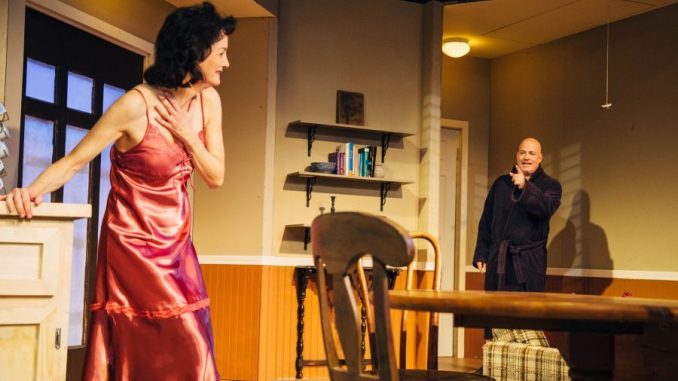
Melissa Weber Bales and Scott Conte in SMART LOVE – Photo by Jeff Lorch
Technology has crept into almost every corner of life these days, so why not into the most secret of spots, the human heart? Playwright Brian Letscher asks that question, and comes up with some fascinating answers. SMART LOVE is a contemporary twist on what makes a human human – and can an artificial human be human? Directed by Elina de Santos, SMART LOVE raises some hilarious questions – and then responds with even more uproarious replies. Mary Shelly is probably smiling from afar.
 Melissa Weber Bales and Zachary Grant – Photo by Jeff Lorch
Melissa Weber Bales and Zachary Grant – Photo by Jeff Lorch
The good widow Wachowski (Melissa Weber Bales) has finally finished mourning the loss of her husband and moved on – into the arms of a more-than-willing Victor (Scott Conte). After all, her husband Ron (Michael Mantell) wasn’t exactly perfect. An inveterate inventor, Ron spent more time with his creations than he did with his lonely wife Sandy. And he never even seemed to get the idea that a dirty dish, soap, and water were inexorably bound in a necessary lifelong chore.
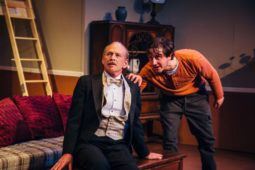 Michael Mantell and Zachary Grant – Photo by Jeff Lorch
Michael Mantell and Zachary Grant – Photo by Jeff Lorch
Just when life seems to be on an even keel again, Sandy gets an unexpected visit from her genius son Benji (Zachary Grant), who has developed a very unusual MIT doctoral project which he wants to share with his mother. A chip off the old block, the technologically sophisticated young man has figured out how to heal his mother and make their family whole again. Enter dad – but a new and improved dad. Even if he has some quirky computer-like glitches, he still knows how to charm his stunned wife. And Benji is all set to marry them again. But wait – what about Victor? And, besides, is a computerized imitation of life, even if charming and dapper, ready to become a real husband and father?
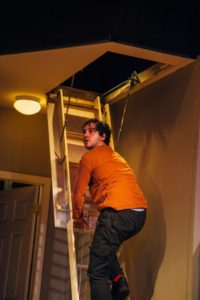 Zachery Grant – Photo by Jeff Lorch
Zachery Grant – Photo by Jeff Lorch
SMART LOVE is a thought-provoking piece (between laughs, of course) which is tailor made for today’s science – and all the ethical and practical questions which current invention may entail. But it’s really hard to ponder such weighty considerations with all the hilarious shenanigans going on. The cast is letter perfect in conveying their emotional roller coaster rides through today’s digital world. David Mauer’s set is also just right, the uninspired rooms belonging to a mundane middle class family located at the edge of a dying Midwestern city. Leigh Allen’s lighting, Christopher Moscatiello’s sound, and Elizabeth A. Cox’s costumes add to the overall ambience. And let’s not forget Myrna Gawryn’s choreography, coupled with Marwa Bernstein’s dance sequence choreography, which lends some zip to the proceedings.
 Zachary Grant and Melissa Weber Bales – Photo by Jeff Lorch
Zachary Grant and Melissa Weber Bales – Photo by Jeff Lorch
SMART LOVE raises some intriguing questions while sandwiched inside a story made for chuckles. This is a light, funny, and charming play which will resonate with today’s millennials – but also with the older crowd who suspect that changes are coming fast enough to make their heads spin. And spin they will as SMART LOVE unravels before the audience’s eyes.
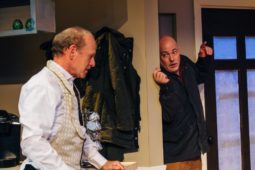
Michael Mantell and Scott Conte – Photo by Jeff Lorch
SPLASH SELECTION
SMART LOVE runs through February 24, 2019, with performances at 8 p.m. on Thursdays through Saturdays and at 3 p.m. on Sundays. Pacific Resident Theatre is located at 703 Venice Blvd., Venice, CA 90291. Tickets range from $25 to $34 (discounts for seniors ($3) and students ($5) on Thursdays and Fridays). For information and reservations, call 310-822-8392 or go online.
Review: Corinne Shor explores identity with style in solo piece ‘I am Sophie’
By F. Kathleen Foley
Nov 18, 2018 | 1:10 PM
Pacific Resident Theatre. (Marlow Everly / Pacific Resident Theatre)
An ebullient woman bounds onstage, chattering in French so voluble it makes one want to go back in time to those high school foreign language lessons and pay more attention.
This is Sophie (Corinne Shor), who has a French accent so thick you could cut it with a baguette knife. Full of bonhomie, joie de vivre and all those other French phrases meaning pure pleasure in life, she has recently deplaned in Minneapolis shortly before the onset of a hard winter.
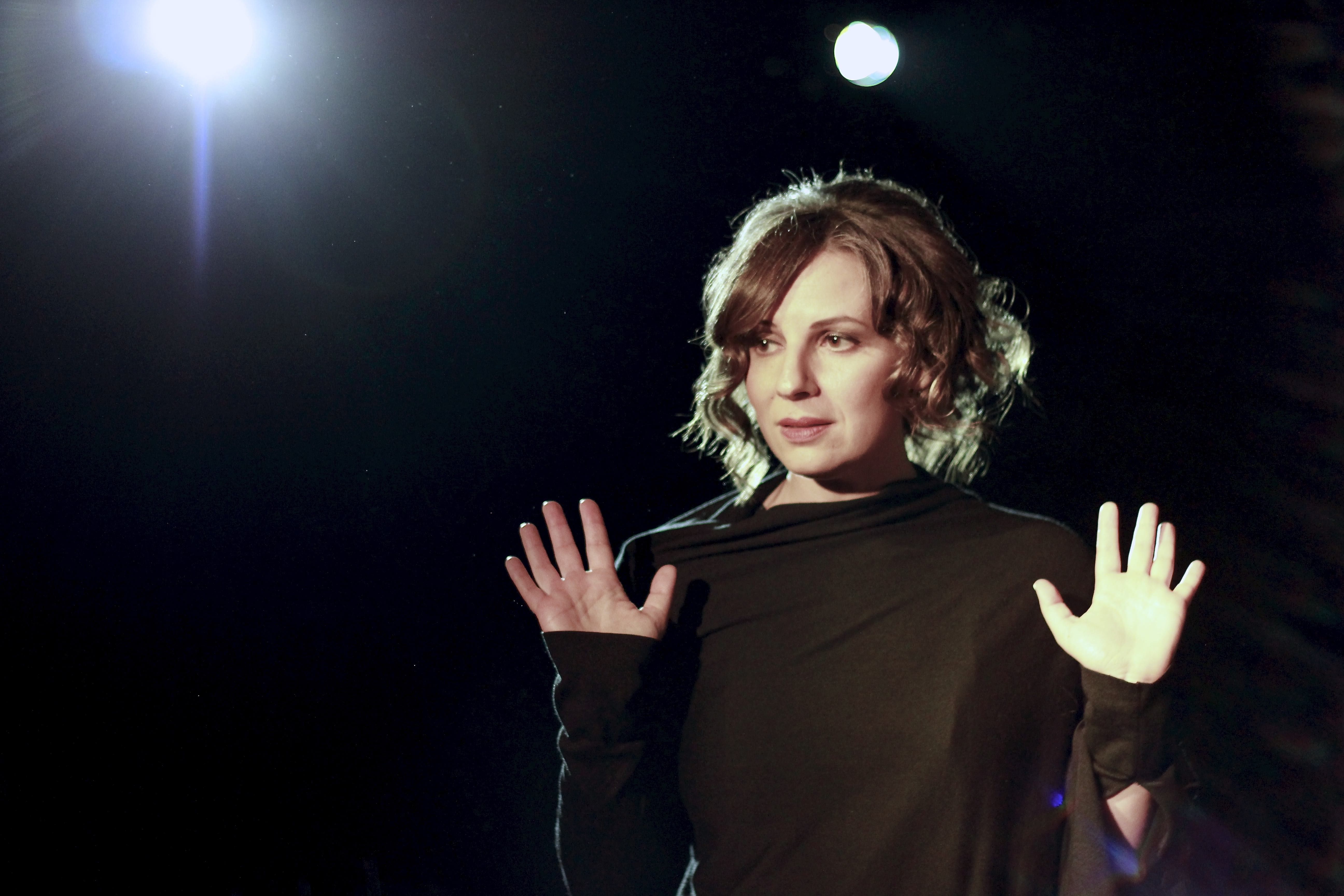 It doesn’t take long for Sophie to confide her very open secret to the audience, whom she invites to become her “confidantes” throughout the brief, rollicking, poignant “I am Sophie,” a solo show directed by Susan Angelo, now at Pacific Resident Theatre.
It doesn’t take long for Sophie to confide her very open secret to the audience, whom she invites to become her “confidantes” throughout the brief, rollicking, poignant “I am Sophie,” a solo show directed by Susan Angelo, now at Pacific Resident Theatre.
It seems that the very French, oh so ooh-la-la Sophie is actually Kate, a Minnesotan born and bred, complete with flat accent and droning intonation. Kate gravitated to Paris a couple of years earlier and returned as the extravagant, lively, irresistible Sophie — whom she adamantly insists is the person she intends to be, now and forever.
A recent “Saturday Night Live” sketch touched on commonalities of things universally detested, including students who studied abroad and returned home with the accents of their host countries. Make no mistake. Sophie’s transformation is no mere affectation, but a deep, conscious choice that, as we later learn, keeps the drab, sad reality of her actual self at bay. But as others react with negativity and dismay, most painfully Sophie-nee-Kate’s cancer-stricken father, Shor’s play touches upon timely issues of what it means to transition into one’s authentic self, despite facing opprobrium from society and loved ones.
Sophie has been called home to run the family business during her father’s decline and, as inevitable loss follows, Shor’s initially comic play deepens into a harrowing portrait of personal grief. The overriding problem of the play, however, is that Shor’s intriguing central premise is presented so reiteratively that even the lighter-than-air, delightful Sophie wears thin on occasion. Still, Sophie’s pursuit of identity is no narcissistic exercise, but a fascinating journey into what constitutes an individual, and how one is defined not only by society but in one’s innermost self.
————-
‘I am Sophie’
Where: Pacific Resident Theatre, 705 ½ Venice Blvd., Venice
When: 8 p.m. Thursdays-Saturdays; 3 p.m. Sundays. Ends Jan. 27. No performances Nov. 22 and Dec. 20-27
Price: $25-$34
Info: (310) 822-8392 pacificresidenttheatre.com
Running time: 1 hour, 25 minutes
“I Am Sophie”: Examining the Meaning of Identity
Posted by Frances Baum Nicholson on September 1, 2018
Corinne Shor – playwright and performer of “I am Sophie,” presented by LA Vie Theatre [photo: Marlow Everly}
The entire idea of identity is one which has come increasingly to the forefront of modern conversation. What makes someone who they are? What if what they see in the mirror isn’t who they feel they are inside? What if being genuine to themselves means not being the person others have always known them to be? What may be lost in the process?
This is the core fascination with Corinne Shor’s “I am Sophie,” a one-woman show performed by the author, now at The Pico. An expansion of Shor’s initial exploration during the 2017 Hollywood Fringe Festival, the play is a monologue by a young Minnesota woman named Kate.
Kate – after spending a period in France – comes home to be near her father in his last hours having turned herself into someone else. She is Sophie. She speaks with a French accent, uses French as much or more than English, and feels freed by the entire process of reinvention. Now, when asked to be Kate, she finds it stilted and a grim denial of who she really is. Some of her family embrace the change. Some do not. It proves good for business, as she and her brother take over the shop, however, some look askance at what they see as playacting.
Director Susan Angelo gets the story beneath the story, and creates a sense of movement which keeps the whole thing from being static: enough furniture, enough costume adjustments, and generally enough business to make Sophie’s journey from discovery to comfort, to true self-acceptance animated, emotional, and consistently engaging. Shor gives to her creation a sense of light and dark and light, as Sophie must occasionally try to be Kate again, and then returns to the person she believes is her personal truth. It all works.
Of course, Sophie’s journey is a metaphor for many other journeys of discovery. As she meets with resistance, finds acceptance (her mother, embracing the change, still warns her she will “lose people” over it) and comes to terms with what her future holds, it can resonate with an audience facing any number of struggles for the self. It is that very universality which makes the play and performance work.
Take a look at “I Am Sophie,” if only to capture a lovely tale, but mostly because it is likely to make you hold up your own mirror to check who you are.
La Vie Theatre Presents “I am Sophie”
“I am Sophie” written and performed by Corinne Show, directed by Susan Angelo runs through September 2.
Running August 17 through September 2, Fridays & Saturdays at 8pm & Sunday September 2 at 5pm, August 31 & September 1 at 4pm & 8pm
“I Am Sophie” is a one women play about one woman who becomes another.
But it’s a little bit more beautifully complicated than that. Something between a fairytale and a survival guide to loss. Loss of self, loss of direction and loss of a loved one.
To set the scene we have Sophie as our guide. Born in Minnesota, re-born in Paris as a teenager on an exchange year, Sophie is the kind of vivacious, life-loving French women we dream of spending summers with in the south of France. She spirals effortlessly through her days with charming truths and deeply thought observations about her life and those around her all spoken in lyrical and loving, sweetly accented prose. Only she is not French and her alter ego Kate, whose family she cuckolds much to their confusion, is hidden away beneath the frothy and exquisite Sophie in a kind of self-imposed retreat from the realities of the life she loathes and her slowly declining and beloved father. Her family are torn between their love for Kate and their acceptance of their Kate’s Sophie. But they know only too well how Kate spent many years in deep depression and even attempted suicide. There are many subtle layers to their toleration of her choice to live as she puts it as “her truest self.”
So what is this play exactly? It’s hard to define really, it’s a puzzle, a person in a paradox unveiling themselves before us. It’s a journey through a long moment of a life. A moment of extreme distress, loss and struggle to survive. Yet “I am Sophie” is much more a cry for freedom than a cry for help. We all struggle with identity, don’t we? Are we mothers, are we daughters, are we lovers, friends, women, men, queer, alone? How we define ourselves ultimately means so much more than how others define us, although it can take a lifetime to work that out and it’s impossibly hard for some of us to ever know how to do that…I only wish there was an app.
“I am Sophie” is a beautiful, gentle, contemplative riff on who we allow ourselves to be. When we were young and unburdened by ego we happily played at being other people. We dressed up, had tea parties, pretended, mimicked and spoke in all manner of strange accents and affectations, and we felt perfectly free to do so. As we grew up we lost the ability to play, to reflect of what makes us who we are and just became what others expected us to be…even those of us who pushed the limits of that are still confined by whatever society surrounds us. So how do we let go of all that and find the best version of ourselves? Is it just as simple as speaking with an accent? Not for Sophie. She chose to save herself by moving to France and becoming the light she so desperately sought. An alternative to depression and suicide and a gift to us who watch her transfixed as she bravely navigates her new life in spite of her father’s passing and other people’s uncomfortable silences. Sophie reminds us that in the end we have only ourselves to prove anything to and in the small hours of the night when we are quite alone, that is all that truly matters.
“I am Sophie,” written and performed by the sublime Corinne Shor is a bold and fearless ode to what makes our hearts sing and saves us from the darkness…it is a strange and beguiling story, as only the best stories are, about a woman who becomes another woman not to survive but to thrive.
I am Sophie.
Reviewed by Julia Stier
RECOMMENDED
“I like me so much better in French,” declares a wide-eyed, charismatic Sophie (Corrine Shor), her thick French accent lilting and flirtatious. Sophie, who has returned home from Paris to care for her ailing father in Minneapolis, is seeing her family for the first time since moving to France. And they’re not taking it well. Because, well, Sophie was born Kate – plain-Jane, American Kate. So who is this woman with this strange, beautiful accent? Who is Sophie?
I am Sophie, written and performed by Corinne Shor and directed by Susan Angelo, is a story of self-discovery. This one-woman show is an illuminating peek into the mind of someone struggling with identity. When Francophile Kate/Sophie decides that she likes her French persona better, she finds that her biggest obstacle isn’t maintaining the transition into this new person — it’s rather getting the ones she loves to accept it.
Shor is enthralling from beginning to end. From her first bubbly “Bonjour!” to her devastating breakdown, she pulls you into her story completely. Moments of heartache are balanced with ones of beauty, and while her tale can get dark, she keeps it from devolving into one of despair.
The script is brilliantly structured so that the audience is included in the narrative. Shor affectionately refers to audience members as “mes confidents,” and shares her journey with us. This relationship saves the show from the awkward trap some solo shows fall into, where the actor must “converse” with an imaginary character.
An imaginative take on the hot topic of identity, I am Sophie. shares a message of acceptance — both of ourselves and of others. It serves as a reminder that we are in control of our identities and our lives, and that we should all be free to live this life as we choose.
Review: I AM SOPHIE by Corinne Shor Takes Audiences on a Journey of Self-Discovery and Re-Invention
by Shari Barrett Aug. 21, 2018
Have you ever wondered what it might be like to re-invent yourself and completely start over as someone else? Perhaps, like me, you spent a lot of time in another country, speaking another language and watching yourself become more like the citizens who live there, totally comfortable in your new skin and personality. It’s a journey of self-discovery and re-invention during which your true inner self is allowed out for perhaps the first time, one in which you can create a more fully free persona and spirit to guide you through the transition. Perhaps the easiest way to let such a thing happen to you occurs when you move to another place where no one knows your name or past, allowing you to live fully in the present and create an entirely new future for yourself as the person you always wanted to be.
Corinne Shor is sharing such a tale about a young French woman named Sophie, Review: I AM SOPHIE by Corinne Shor Takes Audiences on a Journey of Self-Discovery and Re-Inventionborn Kate, who did just that at age 15 when she became a high school foreign exchange student for year, lucky enough to live in Paris for a year with a family incredibly different from her own, yet so in tune with who she really considered herself to be. And I can tell you that Shor’s ability to fully embody the mind, body and spirit of her imaginary character when she declares I AM SOPHIE is so utterly believable, it’s almost impossible to accept that Sophie is just an imaginary character and not really the writer herself telling an autobiographical story of her own life.
As a writer, Corinne Shor admits Review: I AM SOPHIE by Corinne Shor Takes Audiences on a Journey of Self-Discovery and Re-Inventionshe has always used a great deal of improvisation in the early part of her process to allow her characters to find their own way in a story. For over a year and a half, she workshopped I AM SOPHIE in Carole D’Andrea’s weekly Artist Workshop studio before originally performing an abbreviated version of the solo show at The Hollywood Fringe Festival in 2017 to sold out houses. Her updated 90-minute show is now being presented as a full-length intriguing and inspirational production, directed by Susan Angelo, in which Sophie gives you a chance to sit court-side during her adventure transforming herself into a free-spirited French woman from an uptight Midwestern girl.
The play begins with Sophie Review: I AM SOPHIE by Corinne Shor Takes Audiences on a Journey of Self-Discovery and Re-Inventionasking the audience to join her as her much-needed confidante with whom she can share her existential, down the rabbit hole, adventure of self-discovery to become the person she always knew she wanted to be. Born in Minneapolis and named Kate, after living in Paris for a year as a high school exchange student, Kate returns home as “Sophie,” a French-speaking and highly confident free spirit she manifested while there, simply because “I like myself better in French, because in that language everything sounds so much more relaxed.”
Using every muscle in her body, Shor brings into clear focus all the trials and tribulations faced by Kate as she transitions into her new self, Review: I AM SOPHIE by Corinne Shor Takes Audiences on a Journey of Self-Discovery and Re-Inventionmuch the same as anyone going through gender re-identity would do. For not only did she have to become more in touch with herself, everyone around her needed to learn how to accept the fact that the young, uptight woman they knew as Kate was no more. That is, unless Sophie decides to let Kate out, which she finds necessary to do when dealing with her family in crisis.
Told from the standpoint of learning to deal with her father’s terminal illness after returning to her Midwestern home to assist in caring for him, Sophie confides to the audience how difficult it was for her to just let herself BE her French self when faced with her father’s request to “just be my Kate” as he spent his last few days in his bed. When Kate does appear to deliver the eulogy for her father, it is truly an eye-opening character shift that will open your eyes to why Sophie came into being and better represents who this young woman really wants to be in the world.
No doubt this heartfelt play will also wake up your sleeping soul and remind you to go out and live life in whatever way feels best to you – others’ opinions be damned. That said, what a fascinating study it is to watch Sophie as she soars to the highest heights and then plummets to the lowest lows. But what journey of self-discovery doesn’t have that? Beauty and pain so often occur at the same exact time, don’t they?
Baby Doll @ Pacific Resident Theatre
Red hot forbidden love and mind games in the delta of Venice.
Baby Doll @ Pacific Resident Theater

In the first act of “Baby Doll”, we meet Archie Lee, an older hapless cotton-gin owner drilling a peephole to ogle his sleeping bride-to-be, nineteen-year-old Baby Doll. Archie obsessively fawns over an exasperated Baby Doll throughout the play waiting to consummate a deal he made with her dead father. While she dreams of leaving before he can touch her, sleeping in an actual crib due to the lack of furniture Baby Dolls only salvation is her live-in Aunt Rose Comfort who is ceaselessly bullied by Archie’s scorch. The tension is palpable when rival owner Silva Vaccaro gets thrown into the mix. A Sicilian in the deep delta, Silva has come to investigate the mysterious fire that burned his own cotton-gin down the night before. The circumstances of which he suspects ol’ desperate Archie Lee may have something to do with. What happens next is a torrid tale of deception, vengeance and forbidden love.
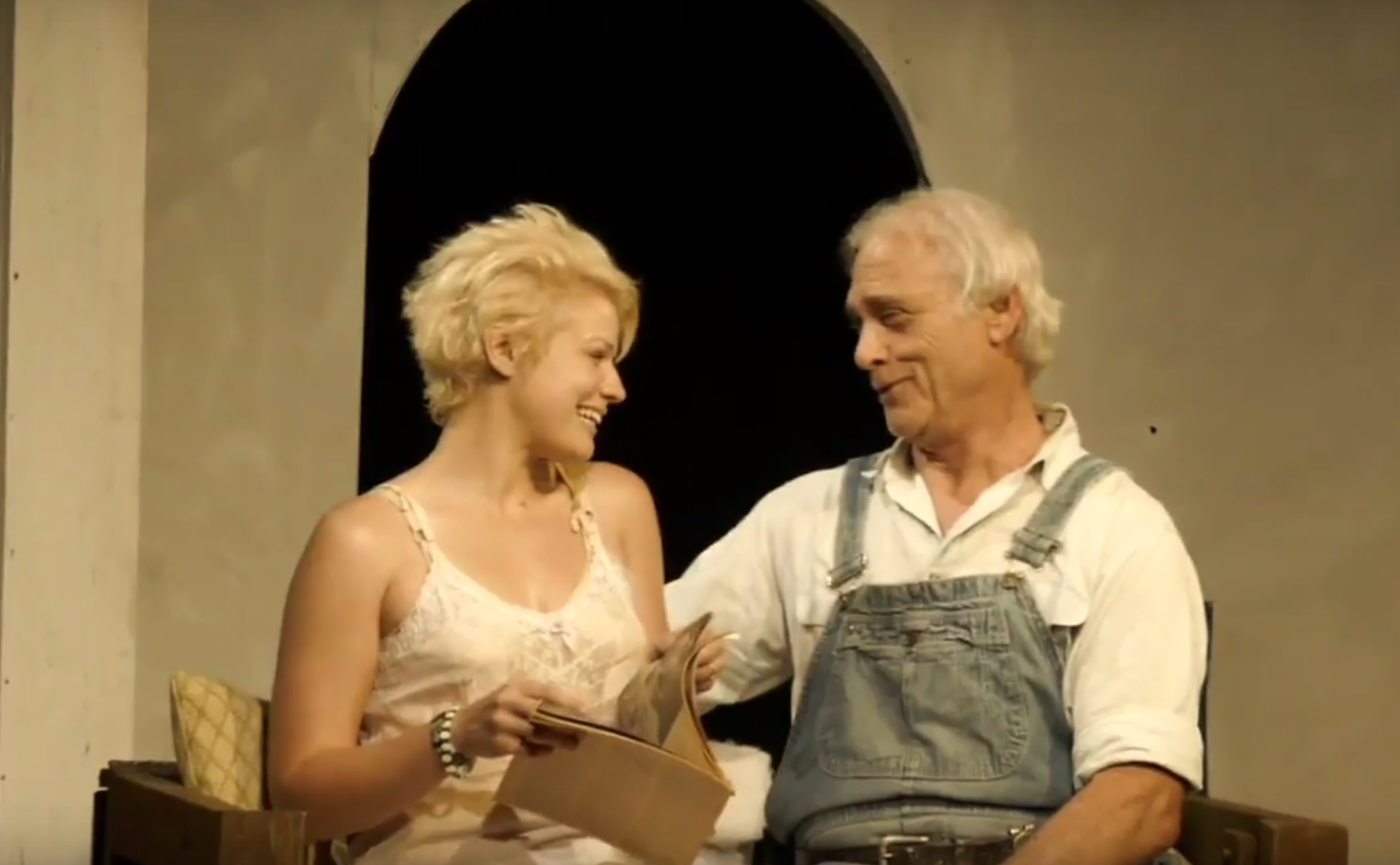 Bryan Kent plays Archie Lee with a remarkable sense of urgency. Here is a character whose mind is in such dysfunction because his cotton-gin has fallen flat. Furniture being sold from his house all the while he drowns in whiskey cajoling over the promise of a young girl. I wondered sometimes if there was actual booze in his bottle. Aunt Rose Comfort, played by PRT legend Penelope Safranek, provided space from the emotional exchanges between Archie and Baby Doll. Safranek’s ability to play the role with a tuned detachment gives us time to breath and offers relief while Kent’s performance of Archie Lee implodes from within. He’s an unpredictable alcoholic capable of mood swings that are both provocative and gripping, so gripping in fact, members of the audience were actually tied to their seats wondering which man we would we get from scene to scene; the good Archie or the drunk Archie. Silva however, played by veteran film and stage actor Bruce Nozick (Big Little Lies, NCIS, Weeds), plays a tough calculating charmer intent on getting to the truth of the matter. He smells a rat in Archie and intends to smoke him out one way or another. Even if that means getting to Baby Doll first.
Bryan Kent plays Archie Lee with a remarkable sense of urgency. Here is a character whose mind is in such dysfunction because his cotton-gin has fallen flat. Furniture being sold from his house all the while he drowns in whiskey cajoling over the promise of a young girl. I wondered sometimes if there was actual booze in his bottle. Aunt Rose Comfort, played by PRT legend Penelope Safranek, provided space from the emotional exchanges between Archie and Baby Doll. Safranek’s ability to play the role with a tuned detachment gives us time to breath and offers relief while Kent’s performance of Archie Lee implodes from within. He’s an unpredictable alcoholic capable of mood swings that are both provocative and gripping, so gripping in fact, members of the audience were actually tied to their seats wondering which man we would we get from scene to scene; the good Archie or the drunk Archie. Silva however, played by veteran film and stage actor Bruce Nozick (Big Little Lies, NCIS, Weeds), plays a tough calculating charmer intent on getting to the truth of the matter. He smells a rat in Archie and intends to smoke him out one way or another. Even if that means getting to Baby Doll first.
Instead of the stereotypical depiction of the Sicilian Silva as seen in the Elias Kazan film version, Nozick brings us a grittier Lords of Flatbush version that is reminiscent of 1980’s Jersey Boy mixed with a time-eternal cowboy. Pitted against one another these two men conjure up a striking paradox. Kent as the good ol’ boy lusting lush and Nozick as the unfettered foreigner seeking truth. This is exactly kind of social commentary you expect from a Tennessee Williams play matched with the current political climate.
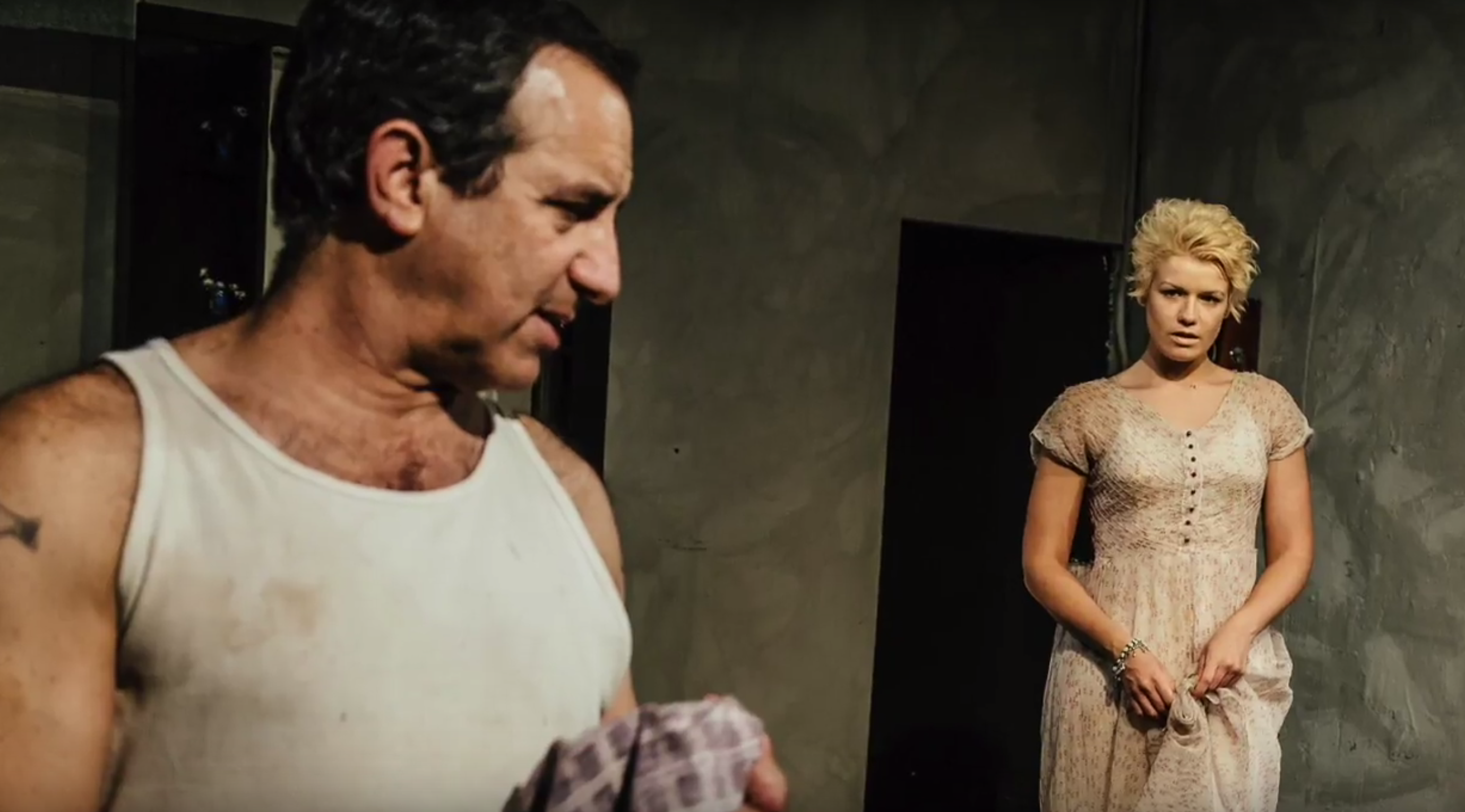 The showstopper however is beholden firmly with the actress in the title role.
The showstopper however is beholden firmly with the actress in the title role.
Greer Sinclair who plays the role of Baby Doll is nothing short of a revelation on stage. Seeming as though she may have just stepped out of a golden era film set in the Mississippi Delta, Sinclair embodies classical elements mixed with a dreamy beauty only seen in eras gone by. A singer/songwriter and performer herself Sinclair carries the production through emotional highs and bittersweet lows with a grace rarely seen in off-broadway theater. Considering this is her first time on the PRT stage this is no little feat. The ease and cadence of her singular performance creates the impression Baby Doll may have been constructed personally for her by Tennessee Williams. When matched against seasoned stage actors like Bryan Kent and Bruce Nozick, Sinclair holds her own giving Baby Doll a timeless certainty. Where other actresses might be seduced into the potential overdramatizing kitsch of the comedic elements in Baby Doll, Sinclair seems grounded authentically in the character quite possibly due to her own New Orleans roots. Sinclair allows an entrance into the internal world of Baby Doll as we spend time simply watching her at rest, at play or waiting for a hero. It was those quiet moments during the show where we could feel the fear, the hope and the potential of what may come her way.
If you go in cold without having seen the film or even without knowing the kind of writer Tennessee Williams was then strap on your best pantaloons and buy the next available ticket because this ensemble cast pulls no punches. Pacific Resident Theater’s version of Baby Doll may ring familiar but it has been artfully crafted for the small space, so expect a slight divergent approach. Fast-paced with light hearted moments to balance the emotional weight you will be left in anticipation of the next act during its single intermission. The play was adapted for the stage by Emily Mann and Pierre Laville. Essential plot-points are intact, however, Director Ann Bronston’s interpretation for the spirited theater synthesizes moments with dialogue beats that mesmerize and engage the audience. Bronston explains, “Solving the production requirements was challenging and fun. The play takes place in about 8 different locations which is pretty hard to define in a small space. I am proud of the simplicity, clarity and fluidity of our scene changes. Essentially we just moved a door and the multi-purpose crib/swing/table piece to create each new location.”
This minimal approach to the set design affords the audience an unparalleled intimacy with the performers as well as the space itself. Bronston manages to tune this aspect of the actor’s relationship to the space just enough for us to feel a sense of mystery while feeling engaged. The acoustic soundscape of jazzy noir interludes and crooning 50s radio enhance the mood of the storytelling even more making a total experience that can only be felt and sensed. As Archie barrels down the aisle finding Silva at his home you feel his primal rage and in-turn Silvas ultimate strategy to goad him along. When Baby Doll pulls up her suitcase to the edge of the stage and looks starry eyed into the night for anyone to save her, you want to help. You are engaging with different part of this restricted space and the effect, this total immersion within it, affords the viewer a more interactive cinematic experience. I’m not sure this dynamic would work otherwise. Artistic Director Marilyn Fox of PRT may have wisely chosen Baby Doll for this stage specifically because it gives exactly that allowance of creating a world at its bare naked minimum. Perhaps a world of it own or at least a unique aesthetic experience that consorts alongside Greer Sinclairs stunning portrayal it feels as though a camera is zoomed in so close — it’s hot to the touch.
When a scene is hot, and I mean whips on skin hot, the chemistry of the room goes to a boil. There’s no hiding on this stage, as we see in a scene where Baby Doll tries to hide in the attic from a teasing Silva who has her alone in the house. He chases her with an actual whip at first lovingly, even caressing her arm with the end, finally building to an impassioned plea for her to admit Archie Lee lit the fire.
“Open sesame,” Silva declares to Baby Doll who is seen audience-side on a ceiling mount elevated above the stage.
“The game is over, I quit! Mr. Vaccaro this whole attic floor is about collapse underneath me.”
“I wouldn’t dream of letting you fall…” A deceptively sneaky Silva responds flogging the wooden support beam beneath her.
“I’m scared of you and your whip. Can you do me a kindness and just leave!”
“Your scared I’m going to whip you? You’re scared I’m going to leave red marks on your body, your creamy silky skin?”
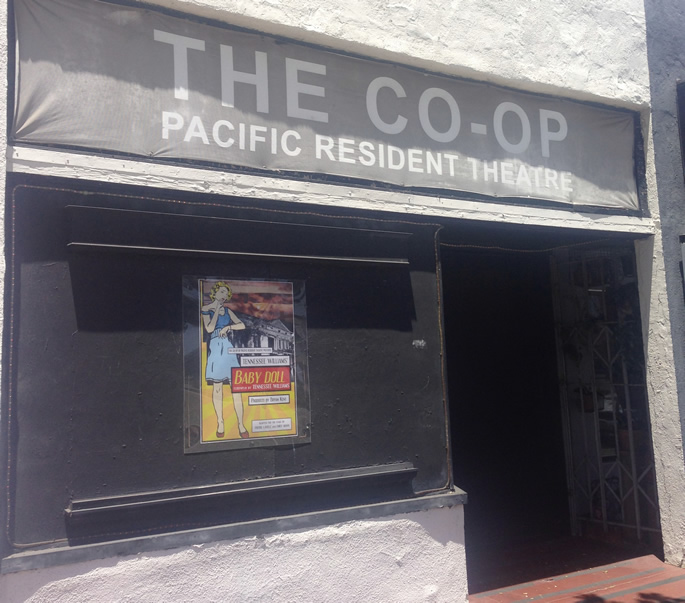 “Uh huh,” Baby Doll whimpers. As the menacing yet detached Silva realizes Baby Doll holds the key to his Sicilian version of divine justice a sense of edge-of-your seat panic truly sets in. We feel the heat of the delta summer, the drip off the nose sweat in the deep south. We wonder if Baby Doll will fall through the attic or worse, what is to become of her. All of this, within the confines of a small local Venice theater.
“Uh huh,” Baby Doll whimpers. As the menacing yet detached Silva realizes Baby Doll holds the key to his Sicilian version of divine justice a sense of edge-of-your seat panic truly sets in. We feel the heat of the delta summer, the drip off the nose sweat in the deep south. We wonder if Baby Doll will fall through the attic or worse, what is to become of her. All of this, within the confines of a small local Venice theater.
Pacific Resident Theater lives in an interdimensional cross-section of Venice in a place where time and space seem to warp ever so subtly. A special kind of magic can be felt in this place. From waiting beside the rustic bar in the box office to watching the amazing actors within arms reach echoing through the walls of it’s intimate haunt. The effect may be due to the lay lines of Abbot Kinney’s original Venice of America. Sharp triangular streets around pythagorean canal geometries weaving within our roughly 3.14 mile piece of our holographic Italian Coney Island. For a small repertory theater taking on the challenge of the material and delivering it with pitch perfect craftmanship is a monumental accomplishment.
“Since this in the perfect place to learn,” Etta James’ voice vibrates out of a transistor radio before the show opens , “teach me tonight.” Behind the tattered windblown scrim separating the audience from the stage we see a projection of a decrepit antebellum mansion surrounded by the detritus of an unkempt owner. As the projection fades with Etta’s voice we will be transported. In that moment, Tennessee Williams brilliant story set in Mississippi during the cotton-gin era will spring to life.
Tennesee Williams Baby Doll adapted for Stage by Emily Mann and Pierre Laville
Directed by Ann Bronston With: GREER SINCLAIR, BRYAN KENT, BRUCE NOZICK, AND PENELOPE SAFRANEK
Orson and Alley Mills Bean keep the audience laughing for 80 minutes in “Alright Then”
By Reta Moser
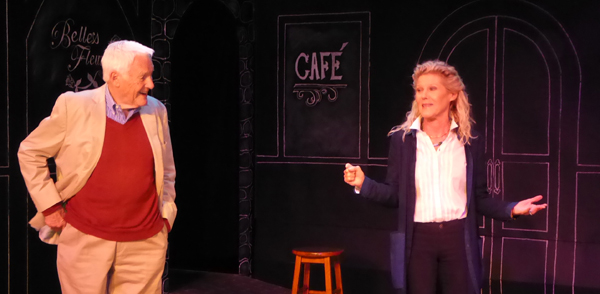 It was a delight! It is a must see for Venetians. I am talking about the Beans’ and their latest hit “Alright Then” at the the Pacific Resident Theatre on Venice Blvd. Show just opened.
It was a delight! It is a must see for Venetians. I am talking about the Beans’ and their latest hit “Alright Then” at the the Pacific Resident Theatre on Venice Blvd. Show just opened.
After the fast 80 minutes, I thought these two are one of the reasons I live in and love Venice. They are unassuming, excessively smart, talented, productive, accessible people who are my neighbors. Venice has some of the all-time talents and these two are prime-prime examples.
They are Venice at its best! They are people at their best!
But back to the play. It is called “Alright Then,” which is the term they used to transition from one segment of each one’s life. They cleverly covered both lives by flipping thru the years with great examples or tales. They kept the audience laughing.
Orson is 22 years older than Alley and for Alley that was insurmountable. And yet they were married. Orson said “She was a fox.” They have been married almost 25 years.
They talked about their childhoods and the demons they collected and conquered. They didn’t delve much into their exciting show biz type lives but some things did come out. Orson had talked about his childhood in his one-man production of “Safe at Home.” which he wrote.
Wow Alley expelled or suspended! One would never think Alley would be the type to be expelled, suspended. The fact that she graduated magna cum laude with the first female class at Yale would be more believable.
I didn’t know that Orson introduced an unknown named Barbara Streisand on The Tonight Show when he was hosting it for Johnny Carson. He hosted The Tonight Show for Johnny Carson more than 100 times. He said, as a standup comedian, his first dressing room was a nail.
Perhaps, there is a sequel in the wings covering their show biz careers.
You can Google them both … Alley Mills Bean and Orson Bean. “They got talent!”
 The almost entirely sung-through tale of a 20something couple whose marriage fails to withstand the pressures of his rise to literary stardom and her failure to achieve success as an actress, The Last Five Years recounts Jamie and Cathy’s love story in the most innovative of ways.
The almost entirely sung-through tale of a 20something couple whose marriage fails to withstand the pressures of his rise to literary stardom and her failure to achieve success as an actress, The Last Five Years recounts Jamie and Cathy’s love story in the most innovative of ways. The result: Joy and sadness side-by-side and an ending that packs a bona fide emotional wallop.
The result: Joy and sadness side-by-side and an ending that packs a bona fide emotional wallop. From the moment Hoffmann launches into “Shiksa Goddess,” it’s clear that the lanky, charismatic leading man will be giving Jamie the goofy humor that’s part of his charm, and later, when Jamie realizes to what extent his celebrity has made Cathy painfully aware of her mostly failed musical theater career, Hoffmann makes “If I Didn’t Believe In You” the heartfelt heartbreaker it is meant to be.
From the moment Hoffmann launches into “Shiksa Goddess,” it’s clear that the lanky, charismatic leading man will be giving Jamie the goofy humor that’s part of his charm, and later, when Jamie realizes to what extent his celebrity has made Cathy painfully aware of her mostly failed musical theater career, Hoffmann makes “If I Didn’t Believe In You” the heartfelt heartbreaker it is meant to be.












